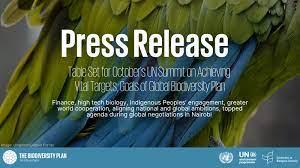
https://www.cbd.int/doc/press/2024/pr-2024-05-30-sbi4-en.pdf
Nairobi, 30 May 2024 – Addressing finance, high tech biology, Indigenous Peoples’ engagement and more, negotiators have set the table for talks at the upcoming UN Biodiversity Conference (COP 16, Cali, Colombia, Oct. 21-Nov. 1).
The UN Convention on Biological Diversity’s Subsidiary Body on Implementation (SBI 4) concluded its 9-day meeting on 29 May 2024, announcing progress on several fronts in worldwide efforts to achieve the ambitious targets for 2030 and goals agreed to in the Kunming-Montreal Global Biodiversity Framework (The Biodiversity Plan) in December, 2022. Actions to “Invest and Collaborate for Nature” – achieve Goal D of the Plan – were central to the SBI’s discussions, with recommendations forwarded to COP 16 on resource mobilization and technical and scientific cooperation.
The financial ambitions set out in the Plan include investing US$ 200 billion a year from all sources, and reforming US$ 500 billion in harmful subsidies. At SBI, governments considered parameters for their own national biodiversity finance plans, the role of multilateral development banks, existing UN initiatives, and private finance. Discussions were also held on the workings of a possible Global Biodiversity Fund, including the role of the Global Environment Facility.
Technical and scientific cooperation to support implementation of the Convention and its Protocols, and the Biodiversity Plan were also considered, and a draft decision for adoption at COP16 was agreed. The Bureau of the Conference of the Parties selected 18 regional organizations worldwide to foster and facilitate technical and scientific cooperation as countries harness science, technology and innovation to help halt and reverse biodiversity loss by 2030.
These subregional support centres will also promote technology transfer among countries, including through joint research programmes and joint technology development ventures, acting as “one-stop service centres” offering wide-ranging resources to help meet Biodiversity Plan targets.
The centres are expected to help expand, scale-up and accelerate efforts such as the existing Bio-Bridge initiative. Implementation of the Biodiversity Plan at national levels is to be shaped by National Biodiversity Strategies and Action Plans that translate The Plan’s 23 action targets into national priorities. In Nairobi, governments agreed this exercise is to be completed by COP 16 or submit aligned national targets.
The meeting also looked at the ways that the contributions of stakeholders such as indigenous peoples and local communities, women, youth, business and civil society, can also be tracked and included. Said Chirra Achalendar Reddy, chair of SBI 4: “I thank the Parties for their commitment to implementation of the Convention as demonstrated by their engagement during the negotiations this week. While we have many issues to resolve at COP 16, the foundation is laid for our discussions in Cali, Colombia, later this year.” “Part of the ambition of the Biodiversity Plan lies in the calls for resource mobilization and technical and scientific cooperation” said David Cooper, Acting Executive Secretary of the Convention. “While many issues need to be resolved at COP 16, the engagement of Parties and stakeholders on all these issues is encouraging.”









